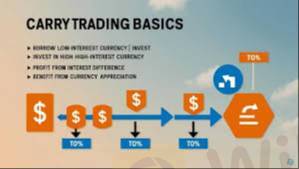
2025-02-12 09:07
IndustryThe role of carry trade strategies in forex trends
#firstdealofthenewyearastylz
Carry trade strategies play a significant role in Forex trends by influencing currency price movements and market sentiment. Here's a comprehensive overview:
What is Carry Trade?
Carry trade involves borrowing a low-yielding currency to invest in a high-yielding currency, aiming to profit from the interest rate differential.
Role of Carry Trade in Forex Trends
1. *Currency Demand and Supply*: Carry trade strategies increase demand for high-yielding currencies, causing their value to appreciate. Conversely, low-yielding currencies experience decreased demand, leading to depreciation.
2. *Interest Rate Differentials*: Carry trade strategies exploit interest rate differentials between currencies. This influences currency price movements, as traders seek to maximize returns from interest rate disparities.
3. *Market Sentiment*: Carry trade strategies contribute to market sentiment, as traders' expectations and perceptions of interest rates and currency values influence their decisions.
4. *Trend Reinforcement*: Carry trade strategies can reinforce existing trends, as traders continue to buy high-yielding currencies and sell low-yielding ones, perpetuating the trend.
5. *Risk Management*: Carry trade strategies involve managing risk, as traders must consider potential losses from currency fluctuations, interest rate changes, and other market factors.
Examples of Carry Trade Strategies
1. *Yen Carry Trade*: Borrowing Japanese Yen (JPY) at low interest rates to invest in higher-yielding currencies, such as the Australian Dollar (AUD) or New Zealand Dollar (NZD).
2. *Swiss Franc Carry Trade*: Borrowing Swiss Francs (CHF) at low interest rates to invest in higher-yielding currencies, such as the Euro (EUR) or British Pound (GBP).
Challenges and Risks
1. *Interest Rate Volatility*: Changes in interest rates can significantly impact carry trade strategies, making them vulnerable to losses.
2. *Currency Volatility*: Currency fluctuations can result in losses, especially if traders fail to hedge their positions adequately.
3. *Leverage*: Carry trade strategies often involve leverage, which can amplify losses as well as gains.
Conclusion
Carry trade strategies play a significant role in shaping Forex trends by influencing currency demand and supply, interest rate differentials, market sentiment, and trend reinforcement. However, traders must be aware of the challenges and risks associated with carry trade strategies, including interest rate volatility, currency volatility, and leverage.
Like 0

Scunscumgbish3148
Broker
Hot content
Industry
Event-A comment a day,Keep rewards worthy up to$27
Industry
Nigeria Event Giveaway-Win₦5000 Mobilephone Credit
Industry
Nigeria Event Giveaway-Win ₦2500 MobilePhoneCredit
Industry
South Africa Event-Come&Win 240ZAR Phone Credit
Industry
Nigeria Event-Discuss Forex&Win2500NGN PhoneCredit
Industry
[Nigeria Event]Discuss&win 2500 Naira Phone Credit
Forum category

Platform

Exhibition

Agent

Recruitment

EA

Industry

Market

Index
The role of carry trade strategies in forex trends
 Hong Kong | 2025-02-12 09:07
Hong Kong | 2025-02-12 09:07#firstdealofthenewyearastylz
Carry trade strategies play a significant role in Forex trends by influencing currency price movements and market sentiment. Here's a comprehensive overview:
What is Carry Trade?
Carry trade involves borrowing a low-yielding currency to invest in a high-yielding currency, aiming to profit from the interest rate differential.
Role of Carry Trade in Forex Trends
1. *Currency Demand and Supply*: Carry trade strategies increase demand for high-yielding currencies, causing their value to appreciate. Conversely, low-yielding currencies experience decreased demand, leading to depreciation.
2. *Interest Rate Differentials*: Carry trade strategies exploit interest rate differentials between currencies. This influences currency price movements, as traders seek to maximize returns from interest rate disparities.
3. *Market Sentiment*: Carry trade strategies contribute to market sentiment, as traders' expectations and perceptions of interest rates and currency values influence their decisions.
4. *Trend Reinforcement*: Carry trade strategies can reinforce existing trends, as traders continue to buy high-yielding currencies and sell low-yielding ones, perpetuating the trend.
5. *Risk Management*: Carry trade strategies involve managing risk, as traders must consider potential losses from currency fluctuations, interest rate changes, and other market factors.
Examples of Carry Trade Strategies
1. *Yen Carry Trade*: Borrowing Japanese Yen (JPY) at low interest rates to invest in higher-yielding currencies, such as the Australian Dollar (AUD) or New Zealand Dollar (NZD).
2. *Swiss Franc Carry Trade*: Borrowing Swiss Francs (CHF) at low interest rates to invest in higher-yielding currencies, such as the Euro (EUR) or British Pound (GBP).
Challenges and Risks
1. *Interest Rate Volatility*: Changes in interest rates can significantly impact carry trade strategies, making them vulnerable to losses.
2. *Currency Volatility*: Currency fluctuations can result in losses, especially if traders fail to hedge their positions adequately.
3. *Leverage*: Carry trade strategies often involve leverage, which can amplify losses as well as gains.
Conclusion
Carry trade strategies play a significant role in shaping Forex trends by influencing currency demand and supply, interest rate differentials, market sentiment, and trend reinforcement. However, traders must be aware of the challenges and risks associated with carry trade strategies, including interest rate volatility, currency volatility, and leverage.
Like 0
I want to comment, too
Submit
0Comments

There is no comment yet. Make the first one.

Submit
There is no comment yet. Make the first one.